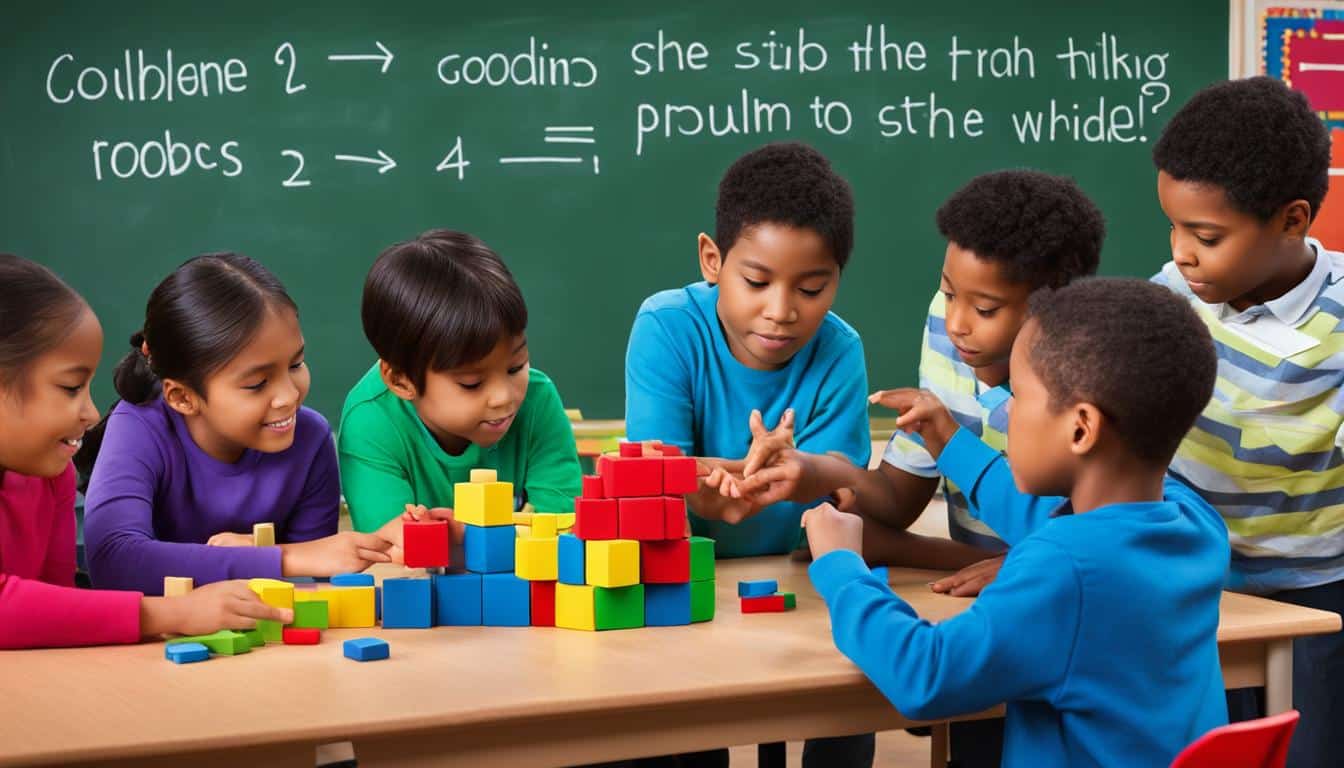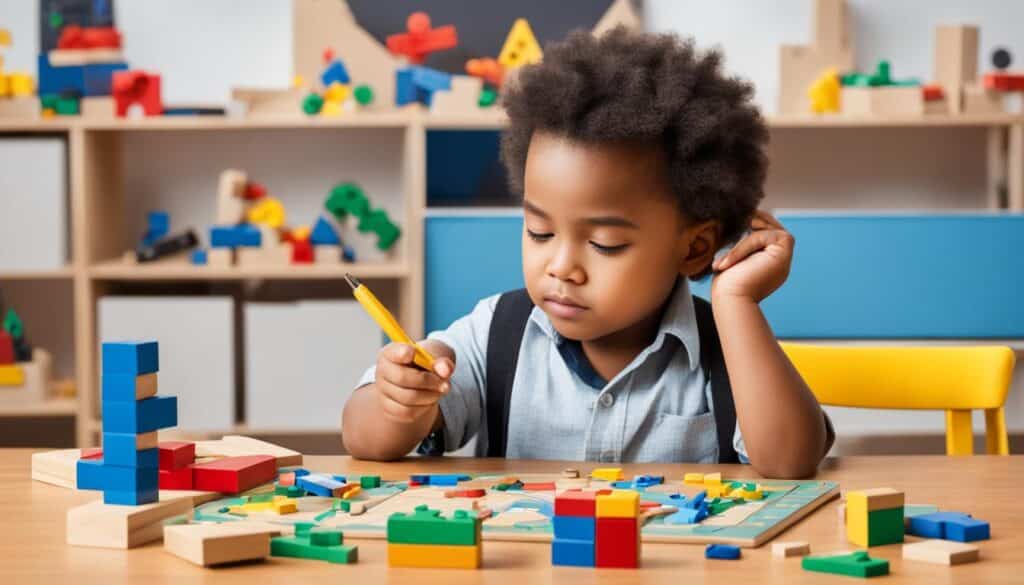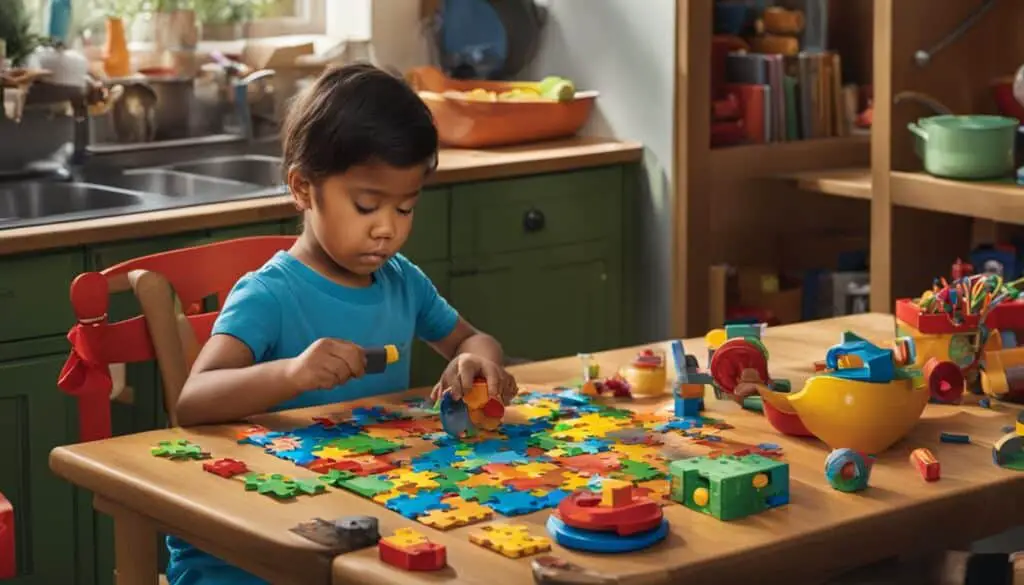
Enhancing Problem-Solving Skills in Children: Techniques and Games
As a parent or educator, you want the best for the children under your care. One skill that is essential for their future success is problem-solving. By enhancing children’s problem-solving skills, we can equip them with a valuable tool to navigate various aspects of life.
Problem-solving is not just about finding solutions to complex problems. It involves critical thinking, analysis, logical reasoning, and decision-making, and it can be taught through various techniques and games. In this section, we will explore effective ways to improve children’s problem-solving skills, along with fun games and activities to help them develop this skill.
Key Takeaways:
- Problem-solving skills are crucial for a child’s future success.
- Enhancing problem-solving skills involves critical thinking, analysis, logical reasoning, and decision-making.
- Techniques and games can be used to improve children’s problem-solving skills.
- Problem-solving should be applied to everyday situations to become a useful skill.
- Effective problem-solving skills can improve a child’s confidence and independence.
Understanding the Importance of Problem-Solving Skills in Children
Problem-solving skills are a crucial aspect of a child’s overall development. As they grow, children encounter various situations that require them to use their analytical skills to solve problems effectively. By fostering problem-solving abilities, we help children develop essential life skills that extend beyond the classroom.
One of the essential benefits of developing problem-solving skills in children is that it equips them with the ability to approach complex problems with confidence. It encourages them to think critically, analyze situations from different perspectives, and devise effective solutions. These skills can help children achieve success in various academic and real-life situations, from completing a complex homework assignment to resolving a conflict with a friend.
Another important benefit of problem-solving is that it helps to cultivate creativity in children. Through problem-solving, children learn to think outside the box, develop new ideas and perspectives, and apply them to solve different problems. This process encourages them to be self-reliant, independent thinkers, paving the way for their future success.
Furthermore, problem-solving skills can also improve a child’s communication and teamwork abilities. When children face difficulties, they can learn to collaborate and establish effective communication with their peers or adults to find solutions. These skills promote healthy social interactions and help develop relationships, both inside and outside of the classroom.
Overall, fostering problem-solving skills in children can contribute to their overall skill development, preparing them for a successful future.
In the following sections, we will examine various techniques and games that can help enhance problem-solving skills in children and provide practical tips on how to integrate problem-solving skills into everyday life.
Techniques for Developing Problem-Solving Skills in Children
As parents and educators, we can employ various techniques to improve children’s problem-solving abilities. With a little effort and dedication, we can help them hone their critical thinking skills and nurture their natural problem-solving abilities.
Encourage critical thinking
One way to develop problem-solving skills is to encourage critical thinking. Encourage children to ask questions, analyze information, and challenge assumptions. This will foster a habit of thinking outside the box and coming up with creative solutions to problems.
Teach systematic approaches
Teaching children systematic approaches to problem-solving can provide them with a structured way of assessing and addressing problems. One such approach is the “5 Whys” technique, which involves asking a series of five “why” questions to get to the root cause of a problem. Another method is the “Fishbone Diagram,” which helps to identify all possible causes of a problem by categorizing them into different groups.

Develop decision-making skills
Decisiveness is an essential component of effective problem-solving. Parents and educators can help children develop their decision-making skills by involving them in decision-making processes. This can be as simple as asking them to help choose what to have for dinner or encouraging them to come up with solutions to everyday problems.
Teach goal-setting
Goal-setting can help children develop problem-solving skills by breaking down larger problems into smaller, achievable goals. It also teaches the importance of planning and perseverance, which are essential skills for problem-solving.
Provide feedback
Providing feedback to children on their problem-solving attempts can help them learn from their mistakes and develop better strategies. Encourage them to reflect on their problem-solving process by asking questions like “What did you do well?” and “What could you have done differently?” This self-reflection will enable them to improve their skills and make better decisions in the future.
Games for Enhancing Children’s Problem-Solving Skills
Games are an excellent way to engage children in problem-solving. They are fun, entertaining, and can promote critical thinking, logical reasoning and decision-making. Here are some games and activities that can enhance children’s problem-solving skills:
| Game Name | Description |
|---|---|
| Rubik’s Cube | A classic puzzle game that requires solving a cube with different colored squares on each side. It promotes pattern recognition, spatial reasoning, and patience. |
| Scavenger Hunt | A game in which children search for a list of items based on clues. It promotes problem-solving, teamwork, and attention to detail. |
| Code Master | A board game that teaches programming through problem-solving. It promotes logical reasoning and critical thinking. |
| Clue | A mystery-solving game where players have to find out who committed the crime. It promotes deductive reasoning, critical thinking, and problem-solving. |
| Chess | A strategy game where players must anticipate and plan their moves. It promotes critical thinking, problem-solving and foresight. |
Most of these games are easily accessible and can be great for family game night. Parents and educators can also create their own games that require critical thinking and decision-making. By incorporating games into children’s daily activities, they can learn and develop valuable problem-solving skills in an enjoyable way.
It’s important to remember that games are only one tool for enhancing problem-solving skills in children. Other techniques, such as encouraging critical thinking and teaching systematic approaches, can also help children develop these skills.
Integrating Problem-Solving Skills in Everyday Life
Developing problem-solving skills in children is an excellent way to help them prepare for future challenges. However, these skills must not remain only restricted to games and other activities. Problem-solving should also be integrated into their everyday life so that they can apply these skills when facing real-world problems.
Here are some valuable tips that can help parents and educators train children to apply their problem-solving skills in everyday life situations:
- Encourage children to seek solutions to everyday problems independently, using the techniques learned during games and activities.
- Give them challenging tasks like cleaning their room or organizing their toys. These tasks present good opportunities for children to apply problem-solving techniques like prioritizing, categorizing, and decision-making.
- Encourage children to identify problems that they encounter and come up with plausible solutions. It could be a leaky faucet or a missing toy, which they can fix or replace.
- Teach children to evaluate their solutions to problems so they can refine and debug them as required.
By demonstrating to children how problem-solving techniques can help them in various situations, they will be more inclined to utilize these approaches when facing future challenges.
Example of Applying Problem-Solving Skills in Everyday Life
Suppose your child needs to pack for a weekend outing with friends. However, the backpack they have is too small to carry all their items. You could suggest that your child creates a list of essential items and non-essential items and then divides them into two groups based on importance. Next, they could find a more spacious bag or remove unnecessary items until everything can fit into the current backpack. The goal of this activity is to help your child think through a problem-solving process that will lead to a successful outcome.
Integrating problem-solving techniques into real-life situations enhances children’s skill application, which is a crucial aspect of their overall development.

Conclusion
In conclusion, I believe that enhancing problem-solving skills in children is essential to their overall development and success. Through the use of effective techniques and engaging games, we can nurture their critical thinking abilities and prepare them for future challenges.
It’s important to remember that problem-solving skills are not limited to specific activities or games. Parents and educators must encourage children to apply problem-solving techniques in everyday situations, from making decisions about schoolwork to resolving conflicts with friends or family members.
By promoting real-life application, we can help children develop valuable problem-solving skills that will benefit them throughout their lives. I hope that the information and techniques presented in this article will be useful to those looking to enhance problem-solving skills in children.
FAQ
Why are problem-solving skills important for children?
Problem-solving skills are vital for children as they help develop critical thinking abilities, promote logical reasoning, and enhance decision-making skills. These skills are crucial for success in various aspects of life, from academic performance to personal and professional growth.
How can problem-solving skills be nurtured in children?
There are several techniques parents and educators can use to foster problem-solving skills in children. Encouraging critical thinking, teaching systematic approaches to problem-solving, and providing opportunities for hands-on learning are some effective strategies.
What are some games that can enhance children’s problem-solving skills?
There are numerous games and activities that can engage children in critical thinking and problem-solving. Examples include puzzles, board games that require strategic thinking, scavenger hunts, and interactive online games specifically designed to enhance problem-solving abilities.
How can problem-solving skills be integrated into everyday life?
It is essential to help children apply their problem-solving skills in real-life situations. Parents and educators can do this by encouraging them to find solutions to everyday problems, involving them in decision-making processes, and providing opportunities to practice problem-solving in various contexts.